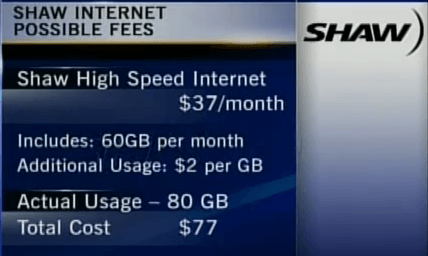 As political pressure over Usage Based Billing continues to keep providers from gravitating towards more stringent Internet Overcharging schemes, western Canadians are enjoying significant victories as providers relax usage caps and increase speeds for broadband service.
As political pressure over Usage Based Billing continues to keep providers from gravitating towards more stringent Internet Overcharging schemes, western Canadians are enjoying significant victories as providers relax usage caps and increase speeds for broadband service.
Weeks after Shaw Communications announced new packages with increased usage allowances and a few unlimited use plans, Telus has now followed Shaw’s lead and doubled usage caps on many of its Internet plans, slashed overlimit fees by more than half for some, and plans to increase upload speeds for one of its premium plans:

Among the major changes are dramatically increased usage allowances and the reduction of overlimit fees.
Telus customers receive their service from the phone company in various flavors of DSL. Some older suburban and rural areas still receive speeds averaging 3Mbps, but those lucky enough to be served by VDSL can comfortably achieve the company’s fastest broadband speeds. The increased usage allowances are welcome news, even if Telus has never strictly enforced any of them:
- High Speed Turbo 25 increased to 500GB, was 250GB;
- High Speed Turbo increased to 250GB, was 125GB;
- High Speed increased to 150GB, was 75GB;
- High Speed Lite increased to 30GB, was 13GB;
- The overlimit fee for High Speed Lite has been reduced from $5/GB to $2/GB;
- Unofficial reports suggest upload speed for Turbo 25 is being increased from 2Mbps to 3Mbps, to be rolled out gradually.
The reduction in the overlimit fee for High Speed Lite was predictable in light of recent political events. It is difficult to sustain the argument that overlimit fees and usage caps are priced to control network congestion when the lightest users face the most draconian limits and penalty fees.
But unlike their cable competitor Shaw Communications, Telus has not seen fit to offer customers a truly unlimited plan, which presents a problem for some.
“Telus needs to remember they cannot win a speed race with Shaw so they should be lowering prices, taking the usage caps off, and competing with something they can actually win — delivering customers the unlimited service they want at a reasonable price,” says Stop the Cap! reader Abel from Burnaby, B.C.
Separately, Telus also quietly introduced a rate increase for basic home telephone service. What used to be $21 a month is now $25, an increase of four dollars.
The dramatic plan changes underway in western Canada come in response to political pressure and consumer ire against Usage Based Billing (UBB). Bell, which provides much of Canada with wholesale broadband access, was seeking to force independent providers to abandon unlimited, flat rate pricing in favor of ubiquitous UBB. The provocation brought a half million Canadians to sign a petition against metering broadband.
For eastern Canada, thus far little has changed as Bell, Rogers, and Videotron continue with business as usual.


 Subscribe
Subscribe










